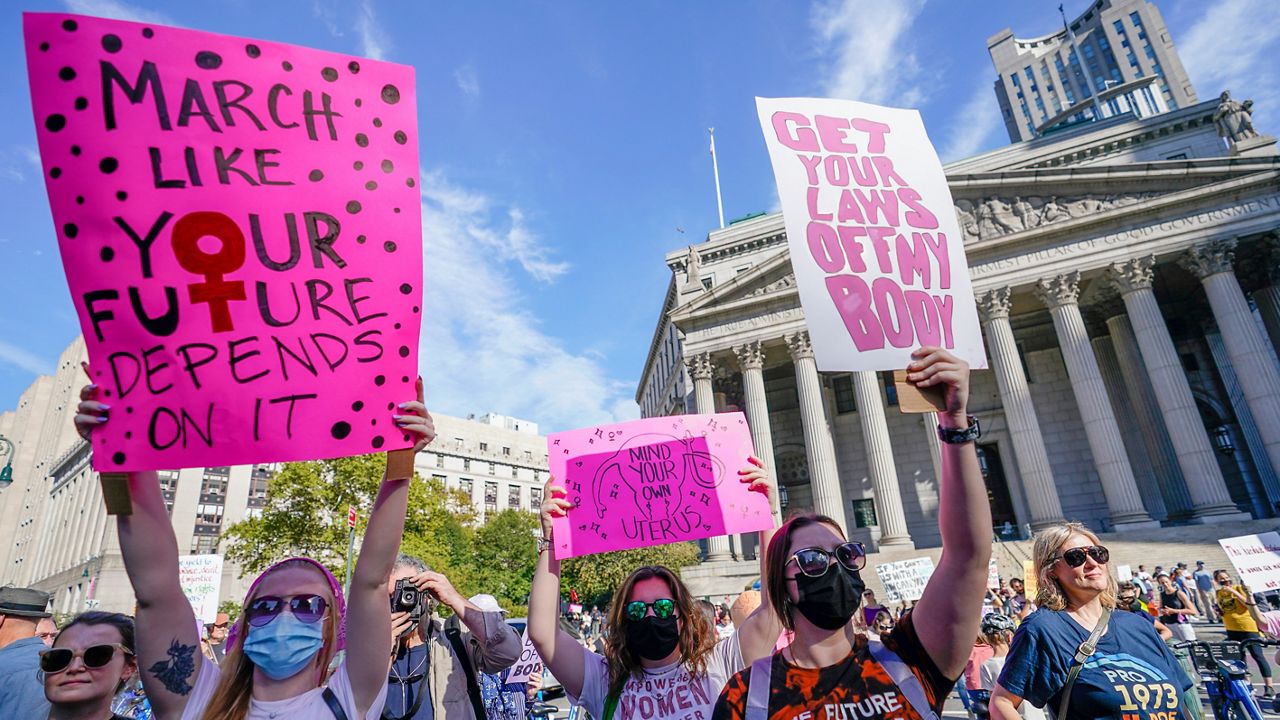The Supreme Court will hear challenges to Texas' controversial abortion law on Monday, Nov. 1, the high court announced Friday, setting the stage for a high-stakes showdown over the nation's most stringent abortion restriction.
The law, known as Senate Bill 8, bans abortions when a fetal heartbeat is detected, which is typically at six weeks, before some women know they are pregnant. The bill, which was signed into law by Republican Gov. Greg Abbot in May and has been in effect since September, makes no exception for rape or incest.
The Texas law was written to evade early federal court review by putting enforcement of it into the hands of private citizens instead of than state officials.
The court will consider this question: "May the United States bring suit in federal court and obtain injunctive or declaratory relief against the State, state court judges, state court clerks, other state officials, or all private parties to prohibit S.B. 8 from being enforced."
The high court will hear two challenges to the restrictive abortion law: One from the Department of Justice and another brought by abortion providers.
In a brief filed earlier Friday, the Biden administration wrote that if the law stays in effect, "no decision of this Court is safe."
"States need not comply with, or even challenge, precedents with which they disagree, the administration wrote. "They may simply outlaw the exercise of whatever rights they disfavor."
"Texas should not obtain a different result simply by pairing its unconstitutional law with an unprecedented enforcement scheme designed to evade the traditional mechanisms for judicial review," the administration added.
A day earlier, the state of Texas urged the court to leave the law in place, saying the federal government lacked the authority to file its lawsuit challenging the Texas ban.
The law will remain in effect in the meantime, the high court decided. Justice Sonia Sotomayor said that the court should have blocked the law immediately.
In a dissenting opinion, Justice Sotomayor wrote that "every day the Court fails to grant relief is devastating, both for individual women and for our constitutional system as a whole."
"For the second time, the court is presented with an application to enjoin a statute enacted in open disregard of the constitutional rights of women seeking abortion care in Texas," Sotomayor wrote. "For the second time, the court declines to act immediately to protect these women from grave and irreparable harm."
"The promise of future adjudication offers cold comfort, however, for Texas women seeking abortion care, who are entitled to relief now," Sotomayor wrote.
Amy Hagstrom Miller, the founder and CEO of Whole Woman's Health and Whole Woman's Health Alliance, which operates four clinics in Texas, salso expressed her disappointment in a statement: "Texans deserved better than this. The legal limbo is excruciating for both patients and our clinic staff."
"Lack of access to safe abortion care is harming our families and communities and will have lasting effects on Texas for decades to come," Hagstrom Miller continued. "We've had to turn hundreds of patients away since this ban took effect, and this ruling means we'll have to keep denying patients the abortion care that they need and deserve. The Supreme Court has said that abortion is protected by our Constitution, yet they are allowing Texans to be deprived of their rights."
"To all the Texans who are with us, who have been speaking up, and to those who may need abortion care, let us be clear: just as we have been in the past, Whole Woman's Health is here for you, and we are here for the long haul," she pledged.
The action by the Supreme Court on Friday means that the high court will hear three major abortion challenges in this term alone: Two to the Texas law and one related to a Mississippi ban on abortions at 15 weeks, which asks the court to overturn both the landmark 1973 decision in Roe v. Wade, which protects a woman's right to choose to have an abortion, and the 1992 decision in Planned Parenthood v. Casey, which blocks states from banning abortions before a fetus can survive outside the womb.
The court will hear arguments in the Mississippi case, Dobbs v. Jackson Women’s Health, on Dec. 1.
The high court already decided 5-4 to let the law take effect, without ruling on its constitutionality. U.S. District Judge Robert Pitman temporarily blocked the law on Oct. 6, saying Texas "deliberately circumvented the traditional process" and "drafted the law with the intent to preclude review by federal courts that have the obligation to safeguard the very rights the statute likely violates."
Texas appealed the decision and the pause lasted just 48 hours.
The Associated Press contributed to this report.



